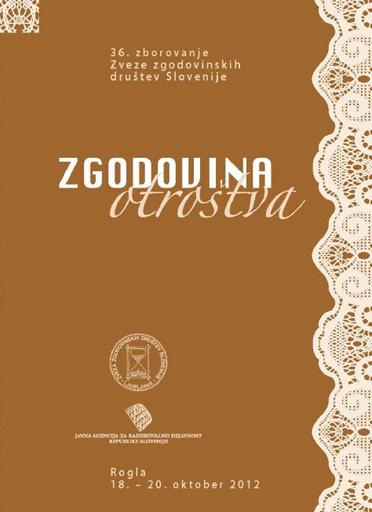/
Dogodki
/
Konference
Bolni otroci in starševske skrbi: odnos do otroškega zdravja na primeru preprečevanja koz v 19. stoletju


To delo avtorja Urška Železnik je ponujeno pod Creative Commons Priznanje avtorstva-Nekomercialno-Brez predelav 4.0 Mednarodna
Datoteke (1)
Opis
Paper provides some starting points for reflection on the attitude toward children’s health in the context of forming definitions of motherhood in the 19th century. On the one hand, the parental responsibility for children's health was still justified through religion, on the other, through the new social demands regarding mothers. One of the opportunities to observe the conceptions of maternal duties about the care of a (sick) child provides the issue of smallpox epidemics and its prevention. General vaccination of children against smallpox started at the end of 18th century and with the initial mistrusting separated the conceptions of 'good mothers' – in this discourse it is possible to observe the variating images of the expected maternal behaviour in different socio-cultural mirrors.
Metapodatki (12)
- identifikatorhttps://hdl.handle.net/11686/37779
- naslov
- Bolni otroci in starševske skrbi: odnos do otroškega zdravja na primeru preprečevanja koz v 19. stoletju
- Sick Children and Parental Care: Attitude Toward Child Health in the Case of Prevention of Smallpox in the 19th Century
- ustvarjalec
- Urška Železnik
- soavtor
- Borut Batagelj (mod.)
- predmet
- črne koze
- variolacija
- vakcinacija
- otroci
- podoba matere
- habsburška monarhija
- smallpox
- variolation
- vaccination
- children
- image of mother
- the Habsburg Monarchy
- opis
- V prispevku je podanih nekaj izhodišč za razmislek o odnosu do otroškega zdravja v kontekstu formiranja definicij materinstva 19. stoletja. Na eni strani se je starševska odgovornost za zdravje otrok še vedno utemeljevala skozi religijo, na drugi pa preko novih družbenih zahtev do mater. Eno od priložnosti za opazovanje koncipiranja materinskih dolžnosti do (bolnih) otrok ponuja problematika epidemij koz in njihovega preprečevanja. Splošno cepljenje otrok proti kozam se je uvajalo od konca 18. stoletja dalje in je z začetnim zbujanjem nezaupanja razdvojilo predstave o 'dobrih materah', v tem diskurzu pa je mogoče opazovati nihanja med podobami o pričakovanem vedenju mater v različnih družbeno-kulturnih zrcalih.
- Paper provides some starting points for reflection on the attitude toward children’s health in the context of forming definitions of motherhood in the 19th century. On the one hand, the parental responsibility for children's health was still justified through religion, on the other, through the new social demands regarding mothers. One of the opportunities to observe the conceptions of maternal duties about the care of a (sick) child provides the issue of smallpox epidemics and its prevention. General vaccination of children against smallpox started at the end of 18th century and with the initial mistrusting separated the conceptions of 'good mothers' – in this discourse it is possible to observe the variating images of the expected maternal behaviour in different socio-cultural mirrors.
- založnik
- Zveza zgodovinskih društev Slovenije
- Inštitut za novejšo zgodovino
- datum
- 2012
- 18. 10. 2012
- tip
- video
- jezik
- Slovenščina
- Angleščina
- jeDelOd
- pravice
- licenca: ccByNcNd
